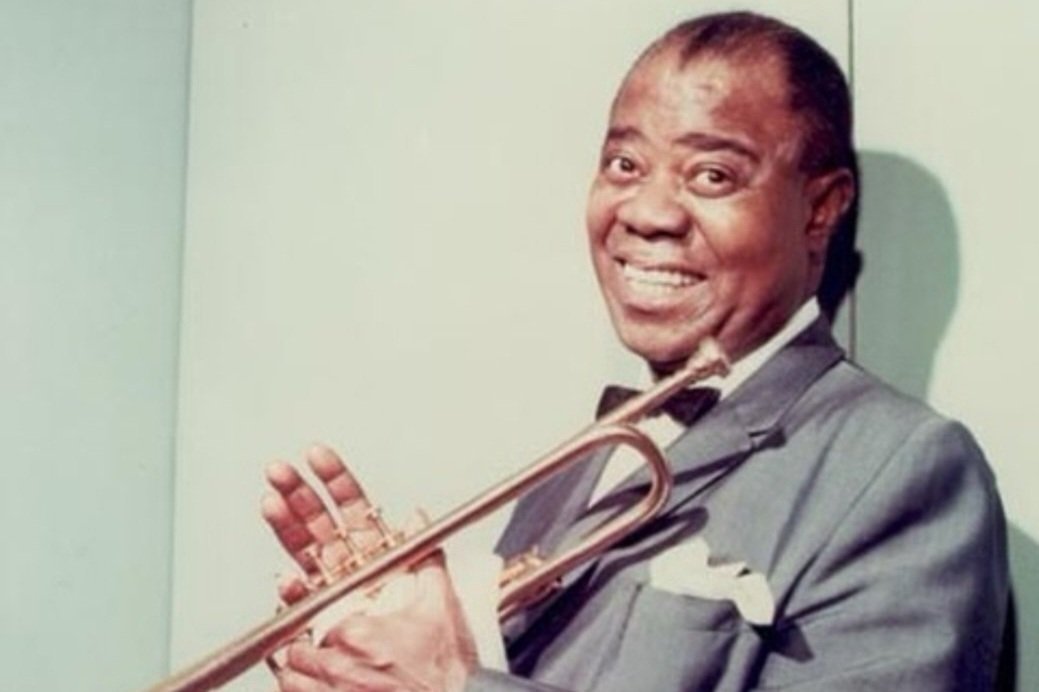Louis Armstrong: An American Jazz Legend

Few American musicians have had the extraordinary impact on jazz music and big band circuits than trumpeter Louis Armstrong. My first experience with his work was both as a musician and an actor, having been enamored with the 1969 movie musical Hello Dolly, starring Barbra Streisand. His presence on the screen in the famous scene at the Harmonia Gardens was unforgettable and led me to wanting to discover more about this celebrated artist.
Armstrong was born in 1901 in New Orleans, Louisiana, and grew up in poverty just as jazz music was beginning to develop. As a young boy he sang in a boys’ quartet and during his time living at the Colored Waifs Home for juvenile delinquents, he learned to play the cornet. He was absorbed in learning music and listening to the leading early jazz players of the day, including the well-known cornetist, King Oliver. In time his skills were strong enough that he not only was able to replace Oliver in an important gig, but soon became one of the most highly skilled trumpet players ever.
Armstrong played alongside Oliver in Oliver’s band in Chicago, where he lived with his wife, the pianist Lil Hardin, for several years before deciding to embark on a solo career. He bounced back and forth between Chicago and New York City and began playing with success in larger orchestras. While in Chicago he made the first of his major recordings between 1925 and 1928. He was already considered famous by 1929 when he performed in Hot Chocolates, a New York City revue. Armstong had long stuck with the blues as a basis for his style and mood, but he began adapting popular tunes by composers such as Duke Ellington, Irving Berlin and Hoagy Carmichael, and simplified his style, offering melodic paraphrases and variations, leading then to improvisations on these melodies.
Another remarkable part of Armstrong's career speaks of his success as a Black man in a time of major racial segregation and discrimination. Even though he achieved critical fame and popularity throughout his lifetime, he was still at times turned away from lodging and harassed by police. Despite his fame, Armstrong was regularly not paid as well as his white contemporaries, and he wasn’t able to perform at all the leading venues across the United States during his tours. However, he played a key role in the Civil Rights Movement in his bravery in denouncing violence against the Little Rock Nine, and he went as far as to threaten to boycott the Academy Awards after the assassination of Martin Luther King, Jr, until they postponed the ceremony in King’s honor. Armstrong was the first African American to be featured in a Hollywood movie.
Armstrong has one of the most recognizable voices in the music industry. His gravely soulful singing voice was truly unique, and he mesmerized his audiences with his infectious laugh, and playful manner in which he engaged his listeners. He was as popular on the radio as he was during his live performances. He was also a pioneer in the art of vocal and instrumental improvisation, and his swing style really transformed jazz into more of a soloist’s art form. Many famous singers were deeply influenced by Armstrong, as is evident in the vocal styles and tones of singers such as Ella Fitzgerald, Frank Sinatra and Billie Holiday to name a few.
The musician’s death in 1971, while not a surprise because of his ill health, was devastating to the entertainment industry, as few people were so beloved for not only their contribution to their craft, but for their radiant smile and personality. His legacy continues through people who were lucky enough to work or record with him, and his recordings made over the decades of his distinguished career will continue to entertain us and all who love jazz.
For more information: https://www.louisarmstronghouse.org/

